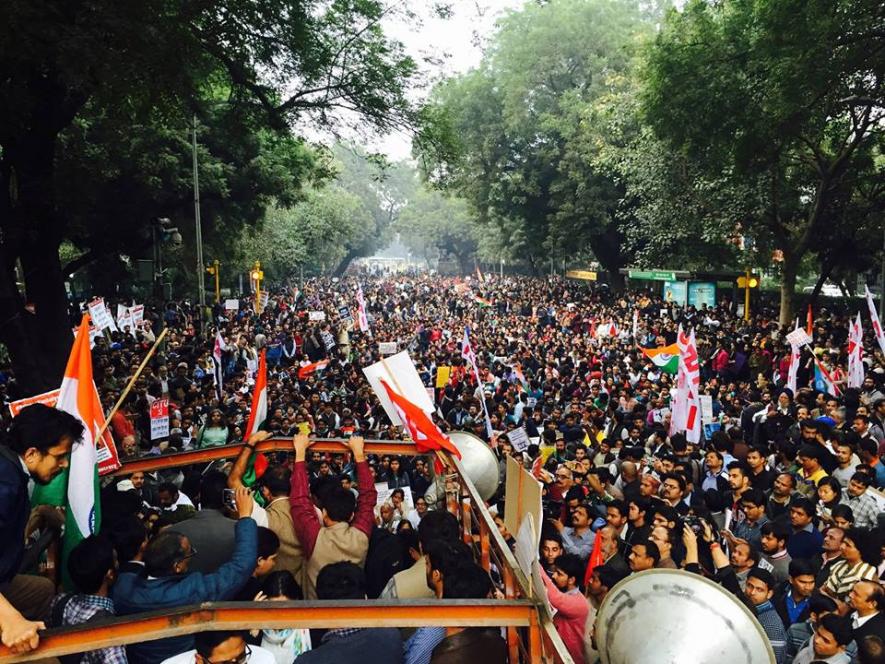Violence Against JNU is an Attack on the Indian Nation
Last week, we saw a redefinition of what constitutes the Indian nation. It is not based on the Constitution, but India as defined by the RSS and the ruling BJP. Anybody who does not agree to this definition of India is guilty of sedition and must be punished. We first saw the hysterical response of the Home Minister and the Education Minister to a meeting in the Jawaharlal Nehru University (JNU), one of the premiere universities in the country. Both ministers acted as judge, jury, and executioner. The JNU students, including the President of the Students Union, Kanhaiya Kumar, were guilty of sedition. The police were instructed by the Home Minister, Rajnath Singh, to take immediate action against the students. Reminiscent of the dark days of the Emergency, they marched into the campus, carried out raids in the hostels and arrested Kanhaiya Kumar. Till date, the only “evidence” the police have offered are blurry tapes played by TV channels, not even the eyewitness account of the three plainclothes policemen who had been deputed for “observing” the meeting.

Image Courtesy: StandWithJNU
Once the BJP bigwigs had pronounced their judgement, street “justice” took over. The judicial process was overwhelmed by the violent goons who gathered in the Patiala House Court. As the Metropolitan Magistrate cowered in her chamber, goons in black coats, presumably lawyers, led by the BJP MLA OP Sharma, physically assaulted the students and teachers of JNU, as well as the media persons. In spite of Supreme Court directions to the police, the same scenes were repeated again two days later. Police stayed “neutral”, as students, teachers and media persons were again subjected to violence in the name of “Mother India”. JNU was besieged by crowds who were mobilised against the “anti-national” JNU.
Could this be happening in plain view of the capital and its media without the sanction of the leadership of the RSS and the BJP? The answer is obvious. What then lies behind the blatant attack on the role of law and the constitutional values of the country? JNU has been one of the most important educational institutions in the country. It has always had a culture of discussion and debate, and a critical way of looking at the world. It has a left student movement, with earlier Students Federation of India (SFI), now All India Students Association (AISA), dominating the campus. Kanhaiya Kumar, the current President, is from the All India Students Federation, another left formation. ABVP, the student wing of the BJP, and NSUI, the Congress student outfit, have only a marginal presence in JNU.
BJP's view of the Indian nation has been different from all other political streams in the country. The Congress, the left, including the socialists, Ambedkarites, all of these political formations had a vision of a nation that includes every section and segment of Indian society. The only political stream that stood for an exclusionary India was the RSS and its various fronts. It argued that Indian nationalism had to be constructed on the basis of religion – India had to be a Hindu nation.
The RSS had virtually no role in the independence movement. While the people of India fought against the British, the RSS fought against the independence movement and the Muslims. They were the mirror image of the Muslim League, which also wanted a nation on the basis of religion. While all other political streams led mass struggles against the British, the RSS and its various offshoots remained outside, spouting venom against the independence movement for including Muslims as equal citizens in its vision of India. It is this absence of an anti-colonial nationalist past that forces the RSS and the BJP, its electoral arm, to try and repeatedly claim a mythical nationalism based on a nationalist past they never had.
The current attack on JNU is not simply an attack against a meeting in which a few people – not clear students, outsiders or agent provocateurs – raised some slogans. As the Supreme Court has ruled that sedition must include incitement to immediate violence, this is not sedition. Locating sedition at the centre of the attack against JNU is not about arguing that such slogans are seditious. It is against the idea of an inclusionary India, the core of the Indian independence movement that JNU – from its professors to its students – espouse.
The sinister nature of the attack against JNU is its violence, both physical and verbal. What “Mother India” is to be established through physical attacks and by hurling abuse against all that do not agree with this perverted view of the Indian nation?
The current BJP and its leadership know only single algorithm for electoral success. Polarise the people, use any means to shut off others, use attacks on other communities. If the Bihar elections were preceded by attacks on rationalist and beef eaters, the current attacks are against all those institutions and sections that believe in a secular, inclusive Indian nation. A Rohit Vemula, a dalit student in Hyderabad Central University, and a Kanhaiya Kumar, the son of an anganvadi worker whose salary is Rs. 3,000, are outside this nation.
The bedrock of this politics is hate: divide the people, attack the core values of the constitution, use violence to settle differences. It manifests itself in social media by substituting abuse for reason. This is what Indians defeated during the independence movement. And this is what Indian people will reject again.
Disclaimer: The views expressed here are the author's personal views, and do not necessarily represent the views of Newsclick.
Get the latest reports & analysis with people's perspective on Protests, movements & deep analytical videos, discussions of the current affairs in your Telegram app. Subscribe to NewsClick's Telegram channel & get Real-Time updates on stories, as they get published on our website.
























